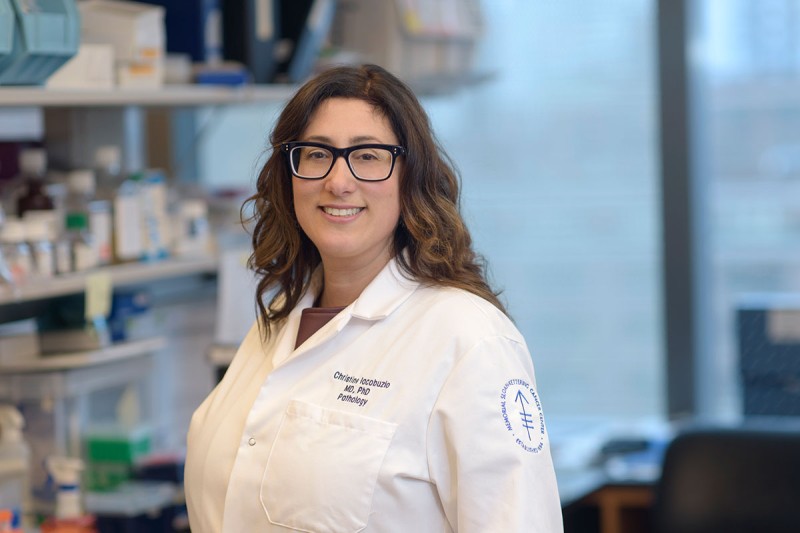
Christine Iacobuzio-Donahue in her laboratory at MSK. She is working with researchers at the American Museum of Natural History to gain a greater understanding of cancer as an evolutionary process.
Physician-scientist Christine Iacobuzio-Donahue is Interim Director of MSK’s David M. Rubenstein Center for Pancreatic Cancer Research. She studies cancer metastasis and is collaborating on genetics research with scientists at the American Museum of Natural History.
You study the evolutionary mechanisms of cancer. What does that mean?
Cancer is, at its most basic, a disease of evolution. Cancer cells are constantly adapting to their surroundings so that they can continue to grow. Cancer takes over your body the same way a weed takes over your lawn. Evolutionary processes that allow things to change and grow in nature also happen in human beings.
So the way species evolve is just like the way an individual cancer evolves?
Exactly. Here’s another example: Monkeys lived in Africa but eventually some ended up in South America. They floated there on some kind of raft. Cancer does the same thing when it metastasizes. It can catch a ride on a blood cell and travel to another part of the body. It then evolves new characteristics based on its new environment.
How did your work with the American Museum of Natural History come about?
Once I realized that the evolutionary processes of species and cancers were similar, I thought, who understands evolution better than scientists who study evolution? By restricting myself to the study of cancer, I was missing out. My lab is collaborating with several members of the museum’s research staff, including a paleontologist and molecular geneticist and a scientist who studies evolutionary patterns.
What projects are you working on?
Researchers from the American Museum of Natural History were recently studying how more than 900 species of lizard are related. Meanwhile, we were analyzing large numbers of tumor samples from MSK patients. We were seeing a huge bottleneck in how our computers handled that information. But it turns out that the algorithms the museum researchers had developed helped us with our data as well.
What are the long-term goals of this partnership?
By taking advantage of their knowledge about evolution, we can develop an overarching understanding of cancer as an evolutionary process. This knowledge will help us develop new cancer drugs, as well as learn how to combine drugs and the best time to give them to patients.
We’re very excited that our collaborative group just received a $1.5 million grant from the Robert J. Kleberg, Jr. and Helen C. Kleberg Foundation to study the evolution of pancreatic cancer.
How does this project relate to your pancreatic cancer research at MSK?
My lab is focused on gene mutations that drive the growth of primary pancreatic tumors and metastatic pancreatic cancer. By understanding what enables these tumors to evolve and become metastatic, we hope to develop new ways to target them with drugs.
I also lead the Medical Donation Program, which allows people to donate their tumor tissues to MSK after they die. The program allows researchers to analyze tumors that they otherwise couldn’t access safely while a patient is alive. Studying these tissues teaches us how metastases differ from the tumor where they originated — how they evolved.
Is your collaboration with the museum your first nontraditional venture?
It’s not. I was co-author of an art book, Hidden Beauty: Exploring the Aesthetics of Medical Science, that included medical illustrations of the visual aspects of human disease.
What made you want to become a doctor and scientist?
I lost my father to cancer when I was ten years old. For my entire life, I’ve always said I was going to study cancer metastasis. I’ve stayed true to that goal. And it’s given me a perspective that lets me think a little out of the box.






